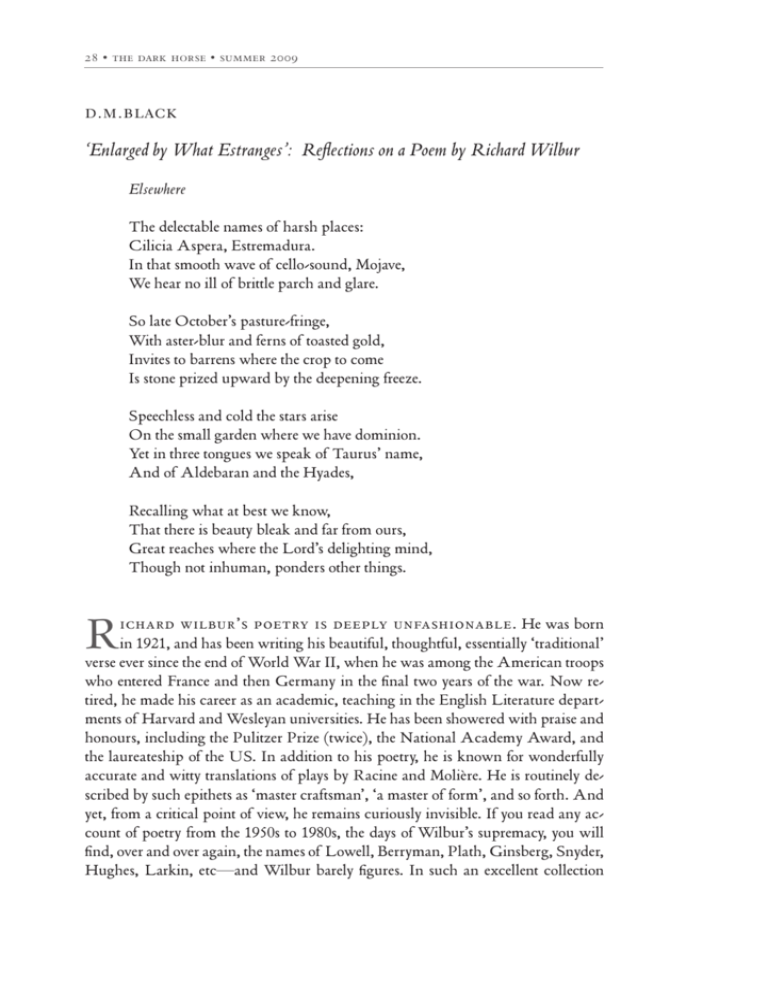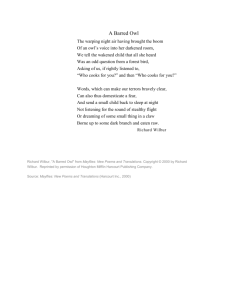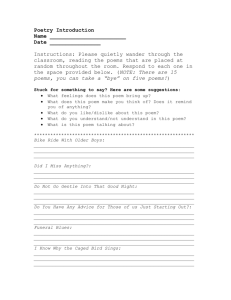Reflections on a Poem by Richard Wilbur
advertisement

28 • the dark horse • summer 2009 d.m.black ‘Enlarged by What Estranges’: Reflections on a Poem by Richard Wilbur Elsewhere The delectable names of harsh places: Cilicia Aspera, Estremadura. In that smooth wave of cello-sound, Mojave, We hear no ill of brittle parch and glare. So late October’s pasture-fringe, With aster-blur and ferns of toasted gold, Invites to barrens where the crop to come Is stone prized upward by the deepening freeze. Speechless and cold the stars arise On the small garden where we have dominion. Yet in three tongues we speak of Taurus’ name, And of Aldebaran and the Hyades, Recalling what at best we know, That there is beauty bleak and far from ours, Great reaches where the Lord’s delighting mind, Though not inhuman, ponders other things. R ichard wilbur’s poetry is deeply unfashionable. He was born in 1921, and has been writing his beautiful, thoughtful, essentially ‘traditional’ verse ever since the end of World War II, when he was among the American troops who entered France and then Germany in the final two years of the war. Now retired, he made his career as an academic, teaching in the English Literature departments of Harvard and Wesleyan universities. He has been showered with praise and honours, including the Pulitzer Prize (twice), the National Academy Award, and the laureateship of the US. In addition to his poetry, he is known for wonderfully accurate and witty translations of plays by Racine and Molière. He is routinely described by such epithets as ‘master craftsman’, ‘a master of form’, and so forth. And yet, from a critical point of view, he remains curiously invisible. If you read any account of poetry from the 1950s to 1980s, the days of Wilbur’s supremacy, you will find, over and over again, the names of Lowell, Berryman, Plath, Ginsberg, Snyder, Hughes, Larkin, etc—and Wilbur barely figures. In such an excellent collection summer 2009 • the dark horse • 29 of critical essays on recent poetry as Seamus Heaney’s Finders Keepers, for example, Wilbur receives (I think) not a single mention. If, as I do, you think Wilbur at least the equal of the poets I have named, then this is quite a puzzle. I want to attempt to address the issue briefly here, because I think it casts an interesting light both on the nature of Wilbur’s excellence, and on the preoccupations of much recent criticism. Perhaps the first thing to say is that Wilbur’s reputation as a ‘formalist’ has not been entirely helpful to him. As far as it goes, it is of course true: the great majority of his poems are in regular forms, often rhyming and scanning in ways familiar to all the main European traditions ever since the Middle Ages. And he works out of a profound immersion in those traditions, particularly French and English. He has translated French poets from medieval Villon to modern Valéry, and in his critical writing he discusses poems by Milton and Tennyson, for example, with the illuminating understanding and sympathy of a fellow-craftsman. But his use of form, extraordinarily brilliant in many of his poems, and seemingly effortless, has tended to dazzle his commentators and imitators: Wilbur without his formal gift is unimaginable, but form is not and can never be the heart of the matter. I have deliberately chosen here to look at his work through the lens of quite a minor poem, ‘Elsewhere’, not by his standards very striking formally, and written, I imagine, in his middle or late 70s. It appeared in his collection, Mayflies, published in 2004 when Wilbur was 83. At first glance, it has many of the characteristics we associate with him: the civilised, non-strident speaking-voice, a warm recognition of the world’s goodness and beauty, no pretence at all to being other than a poem by a cultured, thoughtful man, who weighs his experience honestly and seeks to communicate it directly, and who trusts the reader likewise to be someone of essential seriousness and good will. It is not insignificant that Wilbur remained married to the same woman for more than sixty years: there is a tremendous steadiness in him, and an impressive freedom from narcissistic motives. He has that eye-on-the-object quality that Auden so admired and commended. ‘Elsewhere’ begins, like many of Wilbur’s poems, with quite an ordinary, almost casual observation, such as any of us might make. He notices that places such as deserts, which in reality would be harsh and inhospitable to us, may have remarkably ‘delectable’ names: Cilicia Aspera; Mojave. In the second stanza, he moves to something quite different—linking to it with an enigmatic ‘So’, apparently meaning, ‘In the same way’ (although it’s not immediately clear how what follows parallels what has just been said). The charm of autumn, beautifully if briefly described, invites us on, he says, into winter, signalled by the shockingly rough word ‘barrens’. The harsh quality of winter is then further insisted on by an extraordinary run of strong vowels: ‘stone prized upward by the deepening freeze’. The solemnity of this startlingly powerful line is what first alerts us to the fact that something entirely unexpected is starting to happen to the 30 • the dark horse • summer 2009 tone of this poem. This is not going to be just an amiable disquisition on the beauty of language and the occasional surprising mismatch between signifier and signified. Autumn’s obscuring, beautiful ‘aster-blur’ masked a savage reality, a coming inexorable coldening that will force stones out of their places. We are warned, initially perhaps only subliminally by those grave vowels, that this is a poem about something deeply serious, the power of the forces of winter, the coming of change, the inevitability—remembering that this is a poem by an old man—of ageing and death. And now the final sentence begins, occupying the whole of the two stanzas that make up the second half of the poem. The mood has changed again. Night is falling. The stars are far away and give no comfort: they are ‘speechless and cold’, and ‘we’ have dominion over only a small garden. We are surrounded by a vast and frightening universe. The ‘small garden’ awakens resonances on many levels: it is the garden from which we watch the stars, the small garden of one man’s life and relationships, the small garden of civilised and cultured human life, the small garden of planet Earth itself—all of them vulnerable, all of them requiring, if they are to be preserved, careful tending and cultivation. Our associations guided so strongly by the underlying preoccupations of the poet, we seem to have travelled far from the initial perception, about the delectable names of harsh places. But now Wilbur returns to it. The stars may be speechless, but like the deserts the constellations can have ‘delectable names’, acquired from the complex history of human languages. By yet another unexpected turn of thought, the final stanza now asserts this fact to be meaningful: it carries a further truth which (so Wilbur assures us) at our best we know. He concludes the poem by affirming this knowledge (or, he prefers to say, ‘recalling’ it): That there is beauty bleak and far from ours, Great reaches where the Lord’s delighting mind, Though not inhuman, ponders other things. When I first read this poem, I thought: how on earth did Wilbur get there? By what sleight of hand has he arrived at this extraordinary, profound, resonant and yet curiously modest conclusion, having started (only four stanzas ago) from such an amiable and unassuming perception? One’s surprise is partly because the poem has gone by so quickly, covering more ground than one could quite keep in focus. But, though moving quickly, Wilbur has put in the necessary landmarks to earn his poem’s profound conclusion. The imagery and the technique (the rhythm, the repeated fresh starts of the stanza form, the vowel music) have all been busily at work on our mood, rather as a composer like Schubert might have worked on us by modulating keychanges, moving us emotionally from amiable starting point, to shocked recognition of impending death, to frightened realisation of universal human vulnerability, and finally to ‘the Lord’s delighting mind’ in the powerful, quiet, final stanza. summer 2009 • the dark horse • 31 But, having said that—where exactly have we been led? One senses immediately that the conclusion has great weight and authority, but what, exactly, is it saying? Reading Wilbur, this sense of shock and disturbed feeling is a common experience: one reads his poems with pleasure because of their skill, or wit, or civilised, ‘gracious’ quality—only to find as one reaches the end of the poem that one has been hit by a depth-charge, a shocking impact of emotion contrasting dramatically with the civilised qualities of the surface. This is what I have in mind when I say that to call him a ‘formalist’ is not inaccurate, but doesn’t identify his peculiar excellence. In the present poem, the fact that ‘harsh places’ may have ‘delectable names’ has suddenly returned with new and profound meaning. It is telling us that the harsh places—though they are truly harsh; this isn’t a poem giving easy comfort—can also be seen from a wholly other angle, a perspective so foreign to us that we can only gesture towards it; and from that perspective they too may be good or ‘beautiful’. (‘Beauty’ is a notion that carries a special weight in this poem: it isn’t just aesthetic beauty, as we might find the stars beautiful—or indeed the frozen winter landscape; the idea of beauty is akin here to ‘good’, or to hospitable. It carries a memory of the maternal character of a place where we might feel safe and protected.) This conclusion is an extraordinarily delicate achievement. The Lord’s ‘delighting mind’ is ‘not inhuman’—human beings are also part of the universe the Lord delights in—but it ‘ponders other things’: it includes and values the vast reaches which are utterly alien to humanity, which would in fact annihilate us instantly. ‘The Lord’ here is not particularly the Christian God, and he is used more in the way that poets have in the past used pagan gods such as Eros or Apollo. That is to say, ‘the Lord’ is used as a literary device, not merely decorative, and certainly not meaningless, but not in a way that requires or suggests formal belief. Used in this way, the Lord becomes, so to speak, a resource of potential consciousness: I cannot, as a human being, inhabit a consciousness which whole-heartedly delights in those aspects of the universe which would infallibly destroy me, but I can conceive a greater consciousness than my own which would delight in them, and by imagining that consciousness my own limited perspective, with its terror of death, its tragic sense of the transience of all the lives that are meaningful to me—my own, those of my family, my culture, even my species (all the interpretations we might give to Wilbur’s ‘small garden’)—can to some extent be transcended. The quiet adjectival clause, ‘though not inhuman’, brilliantly delineates the human inside the double negative. It certainly doesn’t disparage the importance of humanity, but it doesn’t deny, either, the encompassing power of the non-human. Standing back from the poem now, we can see that this is a late blossoming of one of the themes that has recurred throughout Wilbur’s poetic career. ‘Elsewhere’ is about the absolute otherness of love, and ‘how we are enlarged / By what estranges’ (to quote another poem, ‘A Wall in the Woods: Cummington’). In a much earlier 32 • the dark horse • summer 2009 poem, ‘Someone Talking to Himself ’ (published in 1961), Wilbur once reflected on the nature of love, and concluded: What can I do but move From folly to defeat, And call that sorrow sweet That teaches us to see The final face of love In what we cannot be? I have pondered those difficult lines over many years. It seems to me they capture a double truth: first, that one’s efforts to love without reserve are always defeated, one’s love can only be always incomplete and unstable, and second, that the person who loves me is always a stranger, just as the person I love is always a stranger. (Yet Wilbur never questions that love is possible). Fifteen years later, the theme recurs in ‘The Eye’ (published in The MindReader, 1976). He first gives a ravishing description of scanning through binoculars across a Caribbean harbour, and goes on to speak of the temptation to become a disembodied onlooker at the world—especially great, we may imagine, for someone with such a stunning gift for observation and description. The eye’s euphoria has to be restrained by a reminder of human reality, that I am ‘here in body’ and not superior in this delighted beholding. The poem ends with a prayer to St Lucy, the patron saint of eyesight: Let me be touched By the alien hands of love forever, That this eye not be folly’s loophole But giver of due regard. This painful, grateful and realistic perception of the alien-ness of what one loves returns again in ‘Elsewhere’. Once more, the generosity of spirit that Wilbur brings to his poems, his joy in the beauty of the world that yet remains clear-sightedly aware of life’s brevity and suffering, allows ‘the Lord’ to delight in, and ponder, ‘other things’, even as the speaker himself is shocked and frightened by this sudden reminder of the vulnerability of all that is precious to him. If I were to single out Wilbur’s peculiar excellences, I would certainly make room to speak of his technical accomplishment and his wonderfully natural use of poetic form. (He once wrote a Ballade for the Duke of Orleans, responding in English to the Duke’s offer, made in 1457, of a prize for the best ballade with the refrain: Je meurs de soif auprès de la fontaine (‘I die of thirst, here at the fountain’s side’). The ballade’s rhyme-scheme runs ababbcbc for three stanzas, followed by a final envoi rhyming bcbc. That requires Wilbur to use the a rhyme 6 times, the b rhyme 14 times summer 2009 • the dark horse • 33 (!), and the c rhyme 8 times (4 of them repeats because of the refrain)—three rhymes in all, to supply twenty-eight lines of energetic verse, including what must be the most dazzling account of catching a fish that poetry has ever managed. This is true virtuosity, without parallel in any recent poet except conceivably Auden.) I would also speak of his wit, his joy in the sensuous particulars of the world (he once devoted sixty lines to mapping in loving detail the traceries of water down a baroque wallfountain), his kindness and psychological acuity, both in understanding others and in noting the grades and depths of his own feeling (‘The Writer’, to name but one example)—all these qualities add up to an enormous richness of poetic resources. But above all I would want to speak of his capacity to use these multitudinous gifts in the service of a serious, life-long determination to tell the truth about his experience, not intellectually (though he is unfailingly very intelligent) but in terms of feeling and perception. To come to know Wilbur’s poems is to come to know a deeply lived feeling-life, with many intricately related facets, and that is ultimately the best thing poetry can give us. His relative neglect by the critics remains to be explained. It is not that his excellence has not been recognised; it has been widely and repeatedly recognised. The question is why it has been so quickly overlooked. Paradoxically, I think the reason must be precisely because his work is so good. It embodies classical virtues: moderation, good manners, immaculate technique without stridency (it’s possible to be a virtuoso without being strident) and without self-pity, clear statement making important and comprehensible points, a use of learning that is not far-fetched and requires little scholarly annotation. It is not modern, nor post-modern, nor is it old-fashioned, though it’s written with a profound awareness of other poets, past and present. Many of his contemporaries wrote out of personal pathology (Lowell, Plath, Berryman, Larkin, etc); others pursued revolutionary social programmes, or non-Western religious traditions (Ginsberg, Snyder, etc); others pursued technical experiment (Creeley, Olson, etc). All these provide many handles for the critic who wants to expound his own literary, psychological, social or historical theories, or use the poems as a springboard for other sorts of discussion. Wilbur’s work offers few handles of this sort. It is there to be experienced, and reflected on, and gone back to. It is not much like a thesis or a programme, a call to arms or a cri de coeur. It is more like a person, a rather unusually civilised person one gradually becomes aware one has met with surprising truthfulness, and whose reliable companionship over the years one values remarkably.








